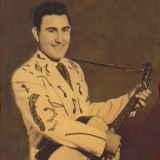Myspace Layouts - Myspace Editor
This page is a Memorial to Webb Pierce. I hope that Webb's Wife and his childrem Webb Jr. his daughter Deborah (she and I share the same name)and grandchildren will like what I have done with this page. I have grown up with stories from my grandparents about their escapades with Webb from my youth. Webb was my grandfathers cousin and they grew up together. They both courted both my grandmother and my step grandmother when my grandmother passed away. There were some funny stories and sad stories, but just normal run of the mill family stories.
Webb Pierce was one of the most successful Country singers of all time. He was the ultimate Honky-Tonk singer. In fact, between 1952 and 1982, he had nearly 100 songs charted, several of which became crossover hits. Even though he wasn't one of the most popular performers among his peers, he developed an extremely loyal group of fans who remain dedicated to his memory.
He was born on August 8, 1926, near West Monroe, Louisiana. His father died when he was only three months old. After his mother remarried, he was raised on a farm seven miles outside of Monroe. There were no music performers in his family but this did not mean he was without country music influences. His mother had a large collection of country records, including those of Gene Autry, whom young Webb also saw in several films. He played excellent guitar in his early teens and when he was 15 he was given his own weekly radio show on Monroe's KMLB, called Songs by Webb Pierce.
He spent three years in the United States Army and in 1942 he married Betty Jane Lewis. Upon leaving the Army, they moved to Shreveport, Louisiana, where he got a job working in the men's department of the Sears Roebuck store. Later, in 1947, the couple appeared on the KTBS morning show as "Webb Pierce with Betty Jane, the Singing Sweetheart." During this time he performed at various local engagements, developing his own unique style that was once described to be "a wailing whiskey-voiced tenor that rang out every drop of emotion." His first recordings were done in 1949 for 4-Star, without much success. Soon he moved to KWKH and was made a member of the Louisiana Hayride during its first year of operation.
In 1950, Webb and Betty Jane were divorced and he started his solo career. He formed Pacemaker Records with the director of the Hayride, Horace Logan. He recorded "Drifting Texas Sands" as Tillman Franks and the Rainbow Valley boys because he was still under contract with 4-Star. As his popularity began to grow, he was signed by Decca and made his first recordings there in 1951. "Wondering" was the start of his successful career, spending four weeks at number 1 in the US Country charts and resulting in his nickname "The Wondering Boy." The next year of 1952 included a new marriage to Audrey Grisham with whom he had two children (Deborah and Webb Jr.) as well as two grandchildren (Audra and Webb III) and a great-grandson (Michael Edward), he left his job at Sears Roebuck, leaving the Hayride, and joining the Grand Ole Opry. He was not able to consistently perform on the Opry as a result of the lucrative concerts he could receive at other venues.
During the 1950's and the early 1960's, Webb Pierce was extremely popular. Among his most famous songs were "There Stands The Glass" (1953), "In The Jailhouse Now" (1955), and "Fallen Angel" (1960). One of his songs, "Slowly," was one of the first recordings to feature the pedal steel guitar. Although the Hawaiian steel guitar was quite common in Nashville, the pedal steel guitar was not, thus bringing something new to the country music scene. However, this novelty was not enough to keep him at the top of the charts. He tried his hand at rockabilly with such songs as "Teenage Boogie" and the Everly Brothers' "Bye Bye Love." And, even with the assistance of the writing talent of Mel Tillis, by 1960 Webb had reached his peak. Rock-n-roll took some of the steam out of his career, like it did for a lot of hardcore country singers. Furthermore, it was not easy to adapt his voice to the up and coming Nashville Sound.
Nevertheless, Webb Pierce was extremely wealthy by this time in his career, becoming known as one of the most flamboyant country singers of his time. He built a $35,000 guitar-shaped swimming pool at his house and began wearing outfits designed by Nudie, a legendary Hollywood Western tailor. He toured extensively and appeared in the movies Buffalo Guns, Music City USA, Second Fiddle To A Steel Guitar, and Road To Nashville. In the late 1960's, he made money on the growing tourist trade in Nashville by opening his house to tourists and selling souvenirs. This started a feud with his neighbor, Ray Stevens, which resulted in a lawsuit that Webb lost.
Pierce remained on Decca and its successor, MCA well into the 1970's. By 1977, he was recording for Plantation Records. Even though he had an occasional minor hit throughout the 1970's, charting as recently as 1982 (in a duet with Willie Nelson, a remake of "In The Jailhouse Now"), it appeared that he was forgotten. His final years were spent tending to his businesses, and his legend became clouded due to his reputation for being a hard drinker. He waged a long battle with cancer, which he finally lost on February 24, 1991.
Webb once reflected on his career saying, "I've been blessed with so much. I guess it turned out the way I wanted it." All you need to do is listen to his old hits and you will come to realize that he did much more than contribute to Country Music - he is one of its true pillars.
